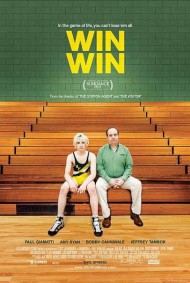If You Haven't Yet Seen "Win Win," You Should Go See It

Remember the movie Garden State from a few years ago that was supposed to be about New Jersey, and was for a while, and was pretty good for like an hour or so, but then it got so bad and fake and sappy at the end that it ended up being more about somewhere else? Hollywood, I guess? Of course you remember. The soundtrack changed your life.
That movie really ticked me off. More than it should have, probably — like I said, it had some good things going for it. But because I’m from New Jersey, and have an emotional attachment to the place, I find myself disproportionately invested in work that represents it. I wish Garden State hadn’t been called Garden State, and had instead been called, I don’t know, Feelings Are Important or something, so the new movie Win Win could have been called Garden State. Because Win Win does everything right all the way through. Win Win is the best movie about New Jersey in a long, long time. It’s hard to tell, having seen it so recently (twice!), and this is a big statement, but I think Win Win might be my favorite movie about New Jersey ever, though I don’t much like the title.
And there are plenty of good movies about New Jersey. New Jersey Drive comes to mind, and Atlantic City and The King of Marvin Gardens. And Clerks and Be Kind Rewind. Oh, City of Hope, which I was reminded of recently. (That is awesome. But that might be less about New Jersey than these other ones — since I think the titular city is supposed to represent more of an American everycity type thing?) And The Station Agent, which was the first movie written and directed by the guy who wrote and directed Win Win, Thomas McCarthy. (Who also wrote and directed another great movie, The Visitor, but is probably most famous for playing a reporter who makes up fake newspaper stories on the last season of The Wire. He is very talented.)
McCarthy grew up in New Providence, the small, North Jersey suburb where Win Win takes place. The protagonist, played by Paul Giamatti, is a lawyer who also coaches the wrestling team at New Providence High School. He is a good, likeable person with a wife, played by Amy Ryan, and two daughters, but who has been having panic attacks because his legal practice is struggling. The wrestling team sucks, too, though that’s secondary. I don’t want to divulge too much of the story here, but Giamatti, acting out of desperation, commits a morally reprehensible act and suffers consequences — the first of which is that a sixteen year-old runaway with bleached hair winds up moving into the house.
The story is told well, and the acting is phenomenal. Particularly the scenes between Amy Ryan and Alex Shaffer, who plays the 16-year-old very much like a young Sean Penn. (If you are from New Jersey and find yourself increasingly affected by well-acted depictions of familial relationships as you get older — maybe it’s because you have a kid, I don’t know — or are otherwise an emotional sap, about halfway through this movie, you may find tears starting to well in your eyes at the simple appearance these two actors together on the screen.) And it’s really funny. Bobby Cannavale — who McCarthy also used in The Station Agent, and who plays Paul Giamatti’s best friend, who is in the midst of a divorce and having a midlife crisis — is extremely good at being from New Jersey. He grew up in Union City, maybe 15 minutes from New Providence.
The whole movie is really good at being from New Jersey. It looks great, which is to say evocatively ugly. Unfortunate fashion choices and horrible architecture under gray skies. Strip malls and too many cars and sickly yellow lighting in high-school locker rooms. But not overdone or cartoony. It looks real. And it gets it at the strength of heart that comes from living in a place that looks like this. Or at least that which we from New Jersey like to imagine comes from that. (If the sound of me singing “Meeting Across the River” or “Thunder Road” to myself as I type this comes through your screen as you read it, feel free to slap me back through the computer cables.)
The movie is about New Jersey as a place but also as an idea. It’s about hardship and fucking up at important things. About losing more than winning. But it’s about making it, in the end, about winning in a way that’s not so often depicted as winning. Because of friendship and love and second chances. So it’s about redemption, like lots of movies. But a different kind of redemption than lots of movies show us. All the redemption it can offer is beneath a dirty hood.
